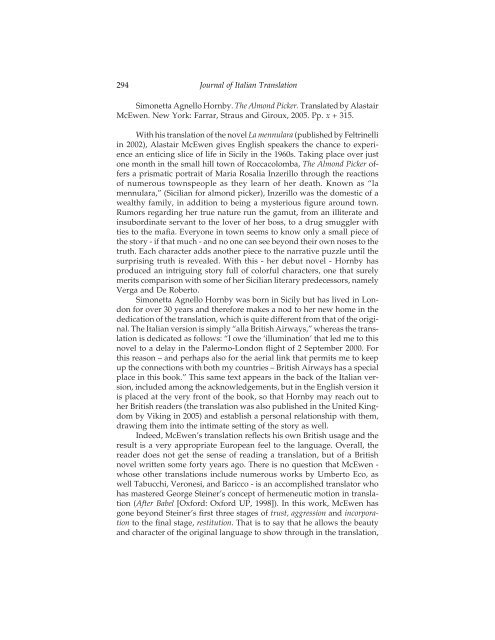Journal of Italian Translation
Journal of Italian Translation
Journal of Italian Translation
You also want an ePaper? Increase the reach of your titles
YUMPU automatically turns print PDFs into web optimized ePapers that Google loves.
294<br />
<strong>Journal</strong> <strong>of</strong> <strong>Italian</strong> <strong>Translation</strong><br />
Simonetta Agnello Hornby. The Almond Picker. Translated by Alastair<br />
McEwen. New York: Farrar, Straus and Giroux, 2005. Pp. x + 315.<br />
With his translation <strong>of</strong> the novel La mennulara (published by Feltrinelli<br />
in 2002), Alastair McEwen gives English speakers the chance to experience<br />
an enticing slice <strong>of</strong> life in Sicily in the 1960s. Taking place over just<br />
one month in the small hill town <strong>of</strong> Roccacolomba, The Almond Picker <strong>of</strong>fers<br />
a prismatic portrait <strong>of</strong> Maria Rosalia Inzerillo through the reactions<br />
<strong>of</strong> numerous townspeople as they learn <strong>of</strong> her death. Known as “la<br />
mennulara,” (Sicilian for almond picker), Inzerillo was the domestic <strong>of</strong> a<br />
wealthy family, in addition to being a mysterious figure around town.<br />
Rumors regarding her true nature run the gamut, from an illiterate and<br />
insubordinate servant to the lover <strong>of</strong> her boss, to a drug smuggler with<br />
ties to the mafia. Everyone in town seems to know only a small piece <strong>of</strong><br />
the story - if that much - and no one can see beyond their own noses to the<br />
truth. Each character adds another piece to the narrative puzzle until the<br />
surprising truth is revealed. With this - her debut novel - Hornby has<br />
produced an intriguing story full <strong>of</strong> colorful characters, one that surely<br />
merits comparison with some <strong>of</strong> her Sicilian literary predecessors, namely<br />
Verga and De Roberto.<br />
Simonetta Agnello Hornby was born in Sicily but has lived in London<br />
for over 30 years and therefore makes a nod to her new home in the<br />
dedication <strong>of</strong> the translation, which is quite different from that <strong>of</strong> the original.<br />
The <strong>Italian</strong> version is simply “alla British Airways,” whereas the translation<br />
is dedicated as follows: “I owe the ‘illumination’ that led me to this<br />
novel to a delay in the Palermo-London flight <strong>of</strong> 2 September 2000. For<br />
this reason – and perhaps also for the aerial link that permits me to keep<br />
up the connections with both my countries – British Airways has a special<br />
place in this book.” This same text appears in the back <strong>of</strong> the <strong>Italian</strong> version,<br />
included among the acknowledgements, but in the English version it<br />
is placed at the very front <strong>of</strong> the book, so that Hornby may reach out to<br />
her British readers (the translation was also published in the United Kingdom<br />
by Viking in 2005) and establish a personal relationship with them,<br />
drawing them into the intimate setting <strong>of</strong> the story as well.<br />
Indeed, McEwen’s translation reflects his own British usage and the<br />
result is a very appropriate European feel to the language. Overall, the<br />
reader does not get the sense <strong>of</strong> reading a translation, but <strong>of</strong> a British<br />
novel written some forty years ago. There is no question that McEwen -<br />
whose other translations include numerous works by Umberto Eco, as<br />
well Tabucchi, Veronesi, and Baricco - is an accomplished translator who<br />
has mastered George Steiner’s concept <strong>of</strong> hermeneutic motion in translation<br />
(After Babel [Oxford: Oxford UP, 1998]). In this work, McEwen has<br />
gone beyond Steiner’s first three stages <strong>of</strong> trust, aggression and incorporation<br />
to the final stage, restitution. That is to say that he allows the beauty<br />
and character <strong>of</strong> the original language to show through in the translation,
















